#conventionist
Explore tagged Tumblr posts
Text
The Conventionist chapter! It delves into the themes of Progress, Revolution, and the infinite. With so much happening, here are just a few observations:
It is evident that Hugo passionately supports both sides of this dialogue. However, initially (and predominantly), his sympathy clearly lies with the Conventionist. Only as Bishop Myriel gradually changes his attitude does Hugo fully embrace his position.
The situation of G___ , old, lonely, and impoverished, reminded me of Georges Pontmercy’s circumstances—also left alone and impoverished after the change of regime.
It was not the Conventionist’s atheism that hardened the bishop’s heart so much (he could tolerate the senator, who was also an atheist), but rather the fact that he was a Conventionist involved (though indirectly) with regicide. Despite initial hostility and opposing views, the bishop surprisingly easily yields after the Conventionist presents arguments related to wrath, ’93, and Louis XVII.
“Right has its wrath, Bishop; and the wrath of right is an element of progress” — I can envision Enjolras saying this.
It’s amusing how M. Myriel seizes the opportunity to affirm his moral standing when the Conventionist makes biased presuppositions about him (as the prince of the church with all his attributes of power). He humbly agrees to things that are not true: “explain to me how my carriage, which is a few paces off behind the trees yonder, how my good table and the moor-hens which I eat on Friday, how my twenty-five thousand francs income, how my palace and my lackeys prove that clemency is not a duty, and that ’93 was not inexorable.”
And, of course, it is Hugo himself saying, “The infinite is. He is there. If the infinite had no person, person would be without limit; it would not be infinite; in other words, it would not exist. There is, then, an I. That I of the infinite is God.”
The bishop asking for the Conventionist’s blessing (and not receiving one) is one of the most moving episodes of the Brick.
36 notes
·
View notes
Text

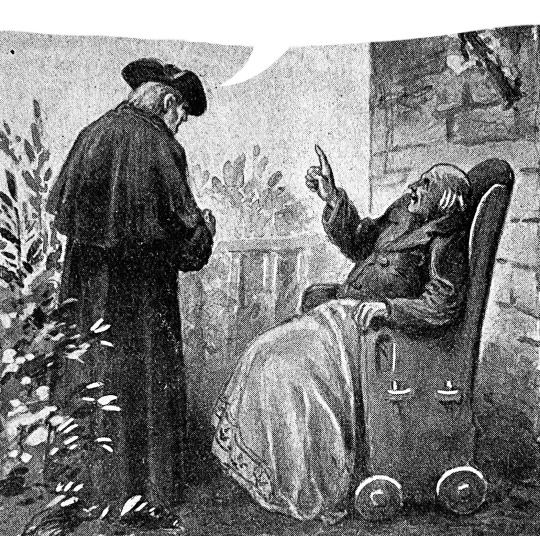
60 notes
·
View notes
Text
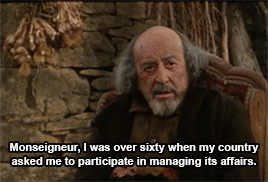
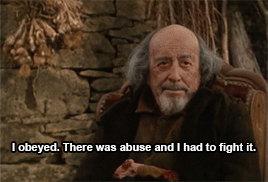
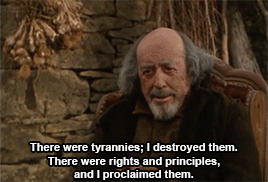
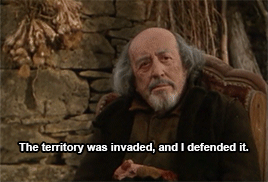
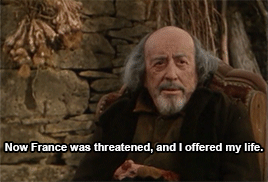
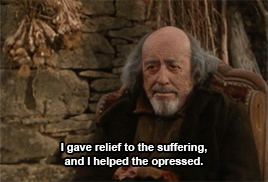

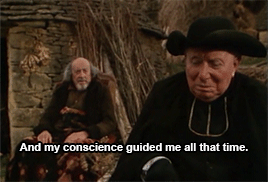
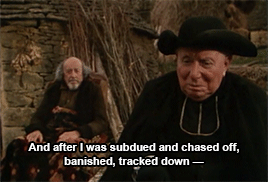
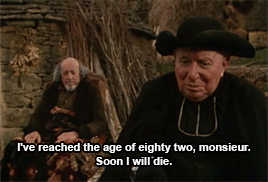
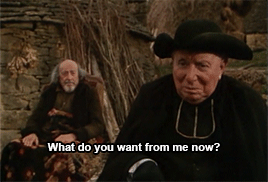
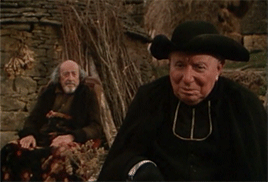
LES MIS LETTERS IN ADAPTATION - The Bishop in the Presence of an Unknown Light, LM 1.1.10 (Les Miserables 1982)
“Bishop,” said he, with a slowness which probably arose more from his dignity of soul than from the failing of his strength, “I have passed my life in meditation, study, and contemplation. I was sixty years of age when my country called me and commanded me to concern myself with its affairs. I obeyed. Abuses existed, I combated them; tyrannies existed, I destroyed them; rights and principles existed, I proclaimed and confessed them. Our territory was invaded, I defended it; France was menaced, I offered my breast. I was not rich; I am poor. I have been one of the masters of the state; the vaults of the treasury were encumbered with specie to such a degree that we were forced to shore up the walls, which were on the point of bursting beneath the weight of gold and silver; I dined in Dead Tree Street, at twenty-two sous. I have succored the oppressed, I have comforted the suffering. I tore the cloth from the altar, it is true; but it was to bind up the wounds of my country. I have always upheld the march forward of the human race, forward towards the light, and I have sometimes resisted progress without pity. I have, when the occasion offered, protected my own adversaries, men of your profession. And there is at Peteghem, in Flanders, at the very spot where the Merovingian kings had their summer palace, a convent of Urbanists, the Abbey of Sainte Claire en Beaulieu, which I saved in 1793. I have done my duty according to my powers, and all the good that I was able. After which, I was hunted down, pursued, persecuted, blackened, jeered at, scorned, cursed, proscribed. For many years past, I with my white hair have been conscious that many people think they have the right to despise me; to the poor ignorant masses I present the visage of one damned. And I accept this isolation of hatred, without hating any one myself. Now I am eighty-six years old; I am on the point of death. What is it that you have come to ask of me?” “Your blessing,” said the Bishop.
#Les Mis#Les Miserables#Les Mis Letters#Les Mis Letters in Adaptation#LM 1.1.10#The Conventionist#M. Myriel#Bishop Myriel#Myriel#lesmisedit#lesmiserablesedit#lesmis1982edit#lesmiserables1982edit#pureanonedits#Les Mis 1982#Les Miserables 1982
86 notes
·
View notes
Text
The Bishop in the Presence of an Unknown Timeline
David Montgomery, illustrious creator of The Siecle (gooooo go listen to it, read the transcripts, it's SO good) , today laid out the necessary historical timeline for the Bishop's visit to the Conventionist! I am copying that over here with permission:
Alright, I have consulted my sources and have interesting findings about the chronology of the Myriel chapters. Chapter X includes the following lines, reflecting popular comments about the Conventionist in town: He was a quasi-regicide. He had been a terrible man. How did it happen that such a man had not been brought before a provost’s court, on the return of the legitimate princes? ... As he had not voted for the death of the king, he had not been included in the decrees of exile, and had been able to remain in France. This references two things: the "provost's court" and the "decrees of exile." Both are real historical things, and both can be dated fairly precisely. The "decrees of exile" could refer to several different things. Promptly upon Louis XVIII's return after Waterloo, he issued a July 24, 1815 blanket amnesty for crimes committed during the Hundred Days — but exempted 56 Bonapartists from pardon. Most were allowed to (encouraged to, even) slip out of the country, where they had to remain for fear of prosecution for treason. But I think this most likely refers to another law, passed on January 12, 1816. This Amnesty Law (subject of fierce negotiations between the ministry and parliament, related mostly to whether it infringed on the king's prerogative of pardon and his July 24 amnesty decree) ultimately exiled the hard-core Bonapartists targeted by the July 24 decree, and also all Regicides who had sided with Napoleon during the Hundred Days. (Regicides who had stayed loyal were not banished.) Provost Courts were special tribunals where military provosts acted as accuser and prosecutor before a panel of civilian judges. Their was no jury, no appeal, and judgment (including death) was carried out within 24 hours. These had existed under Napoleon, but were abolished in 1814 at the First Restoration. Article 63 of Louis XVIII's "Charter of 1814" reads: "...extraordinary commissions and tribunals cannot be created. Provost-courts are not included under this denomination, if their re-establishment is deemed necessary." After Waterloo, the Provost Courts were re-created to deal with political criminals — seditious meetings, rebellion, and threats against the government and royal family. Crucially, however, the Provost Courts were re-established by a law of December 27, 1815. Given the textual references, if one assumes a realistic timeline and no authorial error, then Chapter X could not have taken place before January 1816, and likely (given that the exile decrees and provost courts are discussed in the past and not present tense) at least some time after that date. Sources: Mansel, Philip. Louis XVIII. Rev. ed. Phoenix Mill: Sutton, 1999. Sauvigny, Guillaume de Bertier de. The Bourbon Restoration. Translated by Lynn M. Case. Philadelphia: The University of Pennsylvania Press, 1966. The Charter of 1814: https://en.wikisource.org/wiki/French_Constitutional_Charter_of_1814
#Les Mis Letters#LM 1.1.10#The Conventionist#!!!#Myriel#David Montgomery#long post#I have tried to Repair formatting but tumblr only allows so much ><
34 notes
·
View notes
Text
I want to believe that the conventionist G. from les mis is Gauvain from ninety three in some kind of alternative universe. Does it make any sense? Absolutely not. But i am allowed to dream.
#les miserables#not even the timeline makes sense but#les mis#ninety three#quatrevingt treize#gauvain#conventionist g
4 notes
·
View notes
Text
“Nothing exists in the intellect that was not previously in the senses.”
— St. Thomas Aquinas
#st thomas aquinas#I don't care how good your theory is if doesn't agree with experiment it's wrong#On the Origin of Time#in praise of Tumblr#my unconventional conventionists
5 notes
·
View notes
Text
Les Mis French History Timeline: all the context you need to know to understand Les Mis
Here is a simple timeline of French history as it relates to events in Les Miserables, and to the context of Les Mis's publication! A post like this would’ve really helped me four years ago, when I knew very little about 1830s France or the goals of Les Amis, so I’m making it now that I have the information to share! ^_^
This post will be split into 4 sections: a quick overview of important terms, the history before the novel that’s important to the character's backstories, the history during the novel, and then the history relevant to the 1848-onward circumstances of Hugo’s life and the novel’s publication.
Part 1: Overview
The novel takes place in the aftermath of the Battle of Waterloo, during a period called the Restoration.
The ancient monarchy was overthrown during the French Revolution. After a series of political struggles the revolutionary government was eventually replaced by an empire under Napoleon. Then Napoleon was defeated and sent into exile— but then he briefly came back and seized power for one hundred days—! and then he was defeated yet again for good at the battle of Waterloo in 1815.
After all that political turmoil, kings have been "restored" to the throne of France. The novel begins right as this Restoration begins.
The major political parties important to generally understanding Les Mis (Wildly Oversimplified) are Republicans, Liberals, Bonapartists, and Royalists. It’s worth noting that all these ‘party terms’ changed in meaning/goals over time depending on which type of government was in power. In general though, and just for the sake of reading Les Mis:
Republicans want a Republic, where people have power rather than monarchs and (in this context) elect their leaders democratically— they’re the very left wing progressive ones, and are heavily outcast/censored/policed. Les Amis are Republicans.
Liberals: we don’t have time to go into it, but I don’t think there are any characters in Les Mis defined by their liberalism.
Bonapartists are followers of Napoleon Bonaparte I, who led the Empire. Many viewed the Emperor as more favorable or progressive to them than a king would be. Georges Pontmercy is a Bonapartist, as is Pere Fauchelevent.
Royalists believe in the divine right of Kings; they’re conservative. Someone who is extremely royalist to the point of wanting basically no limits on the king’s power at all are called “Ultraroyalists” or “ultra.” Marius’s conservative grandfather Gillenromand is an ultra royalist. Hugo is also very concerned with criticizing the "Great Man of History," the view that history is pushed forward by the actions of a handful of special great men like kings and emperors. Les Mis aims to focus on the common masses of people who push history forward instead.
Part 2: Timeline of History involved in characters’ Backstories
1789– the March on the bastille/ the beginning of the original French Revolution. A young Myriel, who is then a shallow married aristocrat, flees the country. His family is badly hurt by the Revolution. His wife dies in exile.
1793– Louis XVI is found guilty of committing treason and sentenced to death. The Conventionist G—, the old revolutionary who Myriel talks to, votes against the death of the king.
1795: the Directory rules France. Throughout much of the revolution, including this period, the country is undergoing “dechristianization” policies. Fantine is born at this time. Because the church is not in power as a result of dechristianization, Fantine is unbaptized and has no record of a legal given name, instead going by the nickname Fantine (“enfantine,” childlike.)
1795: The Revolutionary government becomes more conservative. Jean Valjean is arrested.
1804: Napoleon officially crowns himself Emperor of France. the Revolution’s dream of a Republic is dead for a bit. At this time, Myriel returns from his exile and settles down in the provinces of France to work as a humble priest. Then he visits Paris and makes a snarky comment to Napoleon, and Napoleon finds him so witty that he appoints him Bishop.
Part 3: the novel actually begins
1815: Napoleon is defeated at the Battle of Waterloo by the allied nations of Britain and Prussia. Read Hugo’s take on that in the Waterloo Digression! He gets a lot of facts wrong, but that’s Hugo for you.
Marius’s father, Baron Pontmercy, nearly dies on the battlefield. Thenardier steals his belongings.
After Napoleon is defeated, a king is restored to the throne— Louis XVIII, of the House of Bourbon, the ancient royal house that ruled France before the Revolution. In order to ensure that Louis XVIII stays on the throne, the nations of Britian, Prussia, and Russia, send soldiers occupy France. So France is, during the early events of the novel, being occupied by foreign soldiers. This is part of why there are so many references to soldiers on the streets and garrisons and barracks throughout the early portions of the novel. The occupation officially ended in 1818.
1815 (a few months after Waterloo): Jean Valjean is released from prison and walks down the road to Digne, the very same road Napoleon charged down during his last attempt to seize power. Many of the inns he passes by are run by people advertising their connections to Napoleon. Symbolically Valjean is the poor man returning from exile into France, just as Napoleon was the Great Man briefly returning from exile during the 100 days, or King Louis XVIII is the Great King returning from exile to a restored throne.
1817: The Year 1817, which Hugo has a whole chapter-digression about. Louis XVIII of the House of Bourbon is on the throne. Fantine, “the nameless child of the Directory,” is abandoned by Tholomyes.
1821: Napoleon dies in exile.
1825: King Louis XVIII dies. Charles X takes the throne. While Louis XVIII was willing to compromise, Charles X is a far more conservative ultra-royalist. He attempts to bring back something like the Pre-Revolution style of monarchy.
Underground resistance groups, including Republican groups like Les Amis, plot against him.
1827-1828: Georges Pontmercy, bonapartist veteran of Waterloo, dies. Marius, who has been growing up with his abusive Ultra-royalist grandfather and mindlessly repeating his ultra-royalist politics, learns how much his father loved him. He becomes a democratic Bonapartist.
Marius is a little bit late to everything though. He shouts “long live the Emperor!” Even though Napoleon died in 1821 and insults his grandfather by telling him “down with that hog Louis XVIII” even though Louis XVIII has been dead since 1825. He’s a little confused but he’s got the spirit.
Marius leaves his grandfather to live on his own.
1830: “The July Revolution,” also known as the “Three Glorious Days” or “the Second French Revolution.” Rebels built barricades and successfully forced Charles X out of power.
Unfortunately, TL;DR moderate politicians prevented the creation of a Republic and instead installed another more politically progressive king — Louis-Philippe, of the house of Orleans.
Louis-Philippe was a relative of the royal family, had lived in poverty for a time, and described himself as “the citizen-king.” Hugo’s take on him is that he was a good man, but being a king is inherently evil; monarchy is a bad system even if a “good” dictator is on the throne.
The shadow of 1830 is important to Les Mis, and there’s even a whole digression about it in “A Few Pages of History,” a digression most people adapting the novel have clearly skipped. Les Amis would’ve probably been involved in it....though interestingly, only Gavroche and maybe Enjolras are explicitly confirmed to have been there, Gavroche telling Enjolras he participated “when we had that dispute with Charles X.”
Sadly we're following Marius (not Les Amis) in 1830. Hugo mentions that Marius is always too busy thinking to actually participate in political movements. He notes that Marius was pleased by 1830 because he thinks it is a sign of progress, but that he was too dreamy to be involved in it.
1831: in “A Few Pages of History” Hugo describes the various ways Republican groups were plotting what what would later become the June Rebellion– the way resistance groups had underground meetings, spread propaganda with pamphlets, smuggled in gunpowder, etc.
Spring of 1832: there is a massive pandemic of cholera in Paris that exacerbates existing tensions. Marius is described as too distracted by love to notice all the people dying of cholera.
June 1st, 1832: General Lamarque, a member of parliament often critical of the monarchy, dies of cholera.
June 5th and 6th, 1832: the June Rebellion of 1832:
Republicans, students, and workers attempt to overthrow the monarchy, and finally get a democratic Republic For Real This Time. The rebellion is violently crushed by the National Guard.
Enjolras was partially inspired by Charles Jeanne, who led the barricades at Saint-Merry.
Part 4: the context of Les Mis’s publication
February 1848: a successful revolution finally overthrows King Louis Philippe. A younger Victor Hugo, who was appointed a peer of France by Louis-Philippe, is then elected as a representative of Paris in the provisional revolutionary government.
June 1848: This is a lot, and it’s a thing even Hugo’s biographers often gloss over, because it’s a horrific moral failure/complexity of Hugo’s that is completely at odds with the sort of politics he later became known for. The short summary is that in June 1848 there was a working-class rebellion against new labor laws/forced conscription, and Victor Hugo was on the “wrong side of the barricades” working with the government to violently suppress the rebels. To quote from this source:
Much to the disappointment of his supporters, in [Victor Hugo’s] first speech in the national assembly he went after the ateliers or national workshops, which had been a major demand of the workers. Two days later the workshops were closed, workers under twenty-five were conscripted and the rest sent to the countryside. It was a “political purge” and a declaration of war on the Parisian working class that set into motion the June Days, or the second revolution of 1848—an uprising lauded by Marx as one of the first workers’ revolutions. As the barricades went up in Paris, Hugo was tragically on the wrong side. On June 24 the national assembly declared a state of siege with Hugo’s support. Hugo would then sink to a new political low. He was chosen as one of sixty representatives “to go and inform the insurgents that a state of siege existed and that Cavaignac [the officer who had led the suppression of the June revolt] was in control.” With an express mission “to stop the spilling of blood,” Hugo took up arms against the workers of Paris. Thus, Hugo, voice of the voiceless and hero of workers, helped to violently suppress a rebellion led by people whom he in many ways supported—and many of whom supported him. With twisted logic and an even more twisted conscience, Hugo fought and risked his life to crush the June insurrection.
There is an otherwise baffling chapter in Les Mis titled "The Charybdis of the Faubourg Saint Antoine and the Scylla of the Fauborg Du Temple," where Hugo goes on a digression about June of 1848. Hugo contrasts June of 1848 with other rebellions, and insists that the June 1848 Rebellion was Wrong and Different. It is a strangely anti-rebellion classist chapter that feels discordant with the rest of the book. This is because it is Hugo's effort to (indirectly) address criticisms people had of his own involvement in June 1848, and to justify why he believed crushing that rebellion with so much force was necessary. The chapter is often misused to say that Hugo was "anti-violent-rebellion all the time" (which he wasn't) or that "rebellion is bad” is the message of Les Mis (which it isn't) ........but in reality the chapter is about Hugo attempting to justify his own past actions to the reader and to himself, actions which many people on his side of the political spectrum considered a betrayal. He couldn't really have written a novel about the politics of barricades without addressing his actions in June 1848, and he addressed them by attempting to justify them, and he attempted to justify them with a lot of deeply questionable rhetoric. 1848 is a lot, and I don't fully understand all the context yet-- but that general context is necessary to understand why the chapter is even in the novel. Late 1848/1849: Quoting from the earlier source again:
In the wake of the revolution, Hugo tried to make sense of the events of 1848. He tried to straddle the growing polarization between, on the one hand, “the party of order,” which coalesced around Napoleon’s nephew Louis-Napoleon Bonaparte, who in December 1848 had been elected France’s president under a new constitution, and the “party of movement” (or radical Left) that, in the aftermath of 1848, had made considerable advances. In this climate, as Hugo increasingly spoke out, and faced opposition and repression himself, he was radicalized and turned to the Left for support against the tyranny and “barbarism” he saw in the government of Louis Napoleon. The “point of no return” came in 1849. Hugo became one of the loudest and most prominent voices of opposition to Louis Napoleon. In his final and most famous insult to Napoleon, he asked: “Just because we had Napoleon le Grand [Napoleon the Great], do we have to have Napoleon le petit [Napoleon the small]?” Immune from punishment because of his role in the government, Bonaparte retaliated by shutting down Hugo’s newspaper and arresting both his sons.
Thenardier is possibly meant to be Hugo’s caricature of Louis-Napoleon/Napoleon III. He is “Napoleon the small,” an opportunistic scumbag leeching off the legacy of Waterloo and Napoleon to give himself some respectability. He is a metaphorical ‘graverobber of Waterloo’ who has all of Napoleon’s dictatorial pettiness without any of his redeeming qualities.
It’s also worth noting that Marius is Victor “Marie” Hugo’s self-insert. Hugo’s politics changed wildly over time. Like Marius he was a royalist when was young. And like Marius, he looked up to Napoleon and to Napoleon III, before his views of them were shattered. This is reflected in the way Marius has complicated feelings of loyalty to his father (who’s very connected to the original Napoleon I) and to Thenardier (who’s arguably an analogue for Napoleon IiI.)
1851:
On December 2, 1851, Louis Napoleon launched his coup, suspending the republic’s constitution he had sworn to uphold. The National Assembly was occupied by troops. Hugo responded by trying to rally people to the barricades to defend Paris against Napoleon’s seizure of power. Protesters were met with brutal repression. Under increasing threat to his own life, with both of his sons in jail and his death falsely announced, Hugo finally left Paris. He ultimately ended up on the island of Guernsey where he spent much of the next eighteen years and where he would write the bulk of Les Misérables. It was from here that his most radical and political work was smuggled into France.
Hugo arguably did some of his most important political work after being exiled. In Guernsey, he aided with resistance against the regime of Napoleon III. Hugo’s popularity with the masses also meant that his exile was massive news, and a thing all readers of Les Miserables would’ve been deeply familiar with.
This is why there are so many bits of Les Mis where the narrator nostalgically reflects on how much they wish they were in Paris again —these parts are very political; readers would’ve picked up that this was Victor Hugo reflecting on he cruelty of his own exile.
1862-1863: Les Mis is published. It is a barely-veiled call to action against the government of Napoleon III, written about the June Rebellion instead of the current regime partially in order to dodge the censorship laws at the time.
Conservatives despise the book and call it the death of civilization and a dangerous rebellious evil godless text that encourages them to feel bad for the stupid evil criminal rebel poors and etc etc etc– (see @psalm22-6 ‘s excellent translations of the ancient conservative reviews)-- but the novel sells very well. Expressing approval or disapproval of the book is considered inherently political, but fortunately it remains unbanned.
…And that’s it! An ocean of basic historical context about Les Mis!
If anyone has any corrections or additions they would like to make, feel free to add them! I have researched to the best of my ability, but I don’t pretend to be perfect. I also recommend listening to the Siecle podcast, which covers the events of the Bourbon Restoration starting at the Battle of Waterloo, if you're interested in learning more about the period!
#les mis#someone in a discord server asked about this a while back#so i put it together!#it’s basically what I told them in the discord server but as a tumblr post#and with some extra stuff I forgot to say#but yeAH maybe if more historical information gets spread#we’ll get more canon era fanfics >:3333#which are always fun
524 notes
·
View notes
Text
Compiled some thoughts/observation/analysis of Vol I, Book 1!
Les Misérables Vol I, Book 1: A Good Man
Victor Hugo starts everything off with essentially the life and times of Bishop Myriel. Even though he says it has little relevance to do with the rest of the tale, the book not only touches on some major themes (and personal points of conflict for Hugo) but also has some foreshadowing that I already know will make some future scenes hit so much harder.
Less importantly, but more entertainingly, Myriel throws so much shade and gives so many backhanded compliments for a short, happy, elderly guy. Sometimes he's subtle about it and it flies over the head of the person he's talking to, but other times he just goes out of his way to make his disapproval known in very comical ways. Nothing I saw before reading the brick prepared me for this guy having personality, but I'm so happy it's there.
Notes on themes & foreshadowing/parallels under the cut! Would love to read about alternate opinions/things I didn't catch, especially as a first-time reader 👀👀
Themes
When is a violent revolution justified?
Down with the death penalty
What makes a person good?
Nobody's perfect, or why Myriel is a staunch royalist
Hedonism as a privelege for the rich
The importance of education
When is a violent revolution justified?
Myriel seems to have a very micro approach to goodness — he uses most of his own funds for the benefit of those in need and chides the bishops who hoard individual wealth, but repeatedly shies away from political change. It’s both pacifist and very cure-over-prevention, which is what makes his clash with the Conventionist G so interesting.
Their conversation really felt like Hugo’s own internal dialogue, attempting to address the conflict between the progress won through revolutions and the violence wielded to get there. Despite some back and forth, there was a clear ‘victor’ in the debate. G states “I voted for the end of the tyrant. That’s to say, the end of prostitution for women, the end of slavery for men, the end of benightedness for children. In voting for the Republic, that’s what I voted for.” Since this is extremely reminiscent of the preface, it’s clear that this is the voice Hugo endorses. He also appears to give his own definition for when violence is forgivable when G concludes his speech with “Yes, the brutalities of progress are called revolutions. When they are over, what we recognize is this: the human race has had a rough time, but it has advanced.” It’s therefore quite intriguing that he chose to centre Les Misérables around the 1832 rebellion that didn’t succeed. Maybe future chapters will reveal a tighter definition for progress that will include the aftershocks (if any) of the June Rebellion?
Despite ending on a pretty unambiguous statement of philosophy, some of Hugo’s misgivings (previously published in his public announcements regarding past revolutions) are also voiced in this passage, like when Myriel says “You’ve brought about destruction. Destruction can be useful but I distrust destruction compounded with anger.” G responds by listing what that first revolution gifted France (though “sent tides of civilisation sweeping across the earth” could be referring to Napoleon’s conquests which is somewhat unbalancing), but I think the true rebuttal is when he responds with a crime against the people for every crime against the monarchy. This is particularly enjoyable because it mirrors Myriel’s own attitude in rejecting artificial divides between normal people and ‘higher powers’ back from when he wittily rebuked Napoleon.
Down with the death penalty
A vivid part of France’s violent revolutions is of course the use of the guillotine (or more broadly, the death penalty). Hugo uses some pretty unambiguous language to describe and personify the guillotine, leaving us very clear on his personal stance towards the death penalty; namely, that he’s extremely against it. Myriel himself says “I didn’t realize it was so monstrous. It’s wrong to be so deeply absorbed in divine law that you become unaware of human law. Death depends on God alone. By what right do men meddle with this matter of destiny?” Again, lines from the preface incorporated into the text, highlighting how this section is not in fact without bearing on the rest of the story, at least thematically.
However, Myriel’s actions after this revelation are quite interesting. While his exclamation appears to denounce the use of religion as a band-aid or distraction from material, man-made horrors, Myriel henceforth avoids the guillotine and continues to avoid interactions with changing the law. Later, he even says “Whatever his fellow man does, God allows it.” This is in-line with his character, which so far seems to primarily advocate for mercy and mundane acts of kindness, and avoids questioning the religion he serves. He even writes (of god) “Solomon names you Mercy, and of all your names this is the most beautiful.” in one of his books.
This also comes up in his conversation with G, except here it seems Hugo’s stance on the death penalty isn’t part of the debate. Instead, G is a Conventionist who voted against killing Louis XVI. Personally, I get the feeling that Hugo is drawing a line here. It seems like had G voted for Louis XVI’s death, Hugo would have found him unfit as a mouthpiece for his ideology.
What makes a person good?
Certainly not success, or a good social standing. The section where Hugo says “success is a fairly hideous thing. Its false resemblance to merit deceives men.” feels like one side of the coin to one of Les Misérables’ main tenets, with the flipside being that poverty does not imply weakness of character. I have it on pretty good authority that Les Misérables is very much about the goodness of the ordinary or lower class individual as opposed to the greatness of powerful figures, which was clear from Myriel’s very first snipe at Napoleon.
Hugo also describes Myriel as “Infantile if you will, but these sublime infantilisms were those of St Francis of Assisi and Marcus Aurelius.” I have a vague impression of childlike innocence being present in Cosette and to some extent Fantine (given her name). Hugo might not point to it as the primary or sole example of goodness, but he definitely props it up as one of the examples.
Nobody’s perfect, or why Myriel is a staunch royalist
It’s quite paradoxical for Myriel to believe that as a bishop — advisor to the people — he should live close to poverty, but simultaneously be a royalist and therefore implicitly accept that the king — leader of the people — can live in never-before witnessed splendour starting from the reign of Louis XIV.
This character flaw is again emphasised in the passing of Conventionist G, where Myriel (without much given reason) looks at a man peacefully accepting his death and thinks “He did not think there was any sense of God in this manner of dying.”. This is especially jarring since he’d said “Let us fear ourselves. Prejudices are the real robbers.” a couple pages prior.
I guess no character can have it all?
Hedonism as a privilege of the rich
I don’t think I need to make too many notes here — his speech at the end of 1.1.8 speaks for itself. As an excerpt:
You fine gentlemen, as you say, have a philosophy of your own, for yourselves. An exquisite, refined philosophy available only to the rich
But you are kindly princes and you don’t mind that belief in God should be the philosophy of the people, rather in the same way that goose stuffed with chestnuts is the truffled turkey of the poor.
The importance of education
I imagine this will be touched on more later, but for now we have the quote:
Society is to blame for not giving free education. It’s responsible for the darkness it produces. In any benighted soul – that’s where sin will be committed. It’s not he who commits the sin that’s to blame but he who causes the darkness to prevail.’
This is obviously still relevant to us now, but unsurprisingly, the issue of education was even more important in the 19th century. Literacy rates are still quite low, and new scientific/philosophical/political theories were often spread via the written word. You can't convince the illiterate with writing! If the people who are most marginalised are the ones least able to engage with ideologies made to help them, the vehicle that might enable them to connect with new ideas is naturally extremely important.
Foreshadowing/parallels
Myriel’s silver
I think the following quotes speak for themselves, and add so much significance to Myriel’s later actions:
It must be acknowledged, though, that of his former possessions he was still left with six silver forks and spoons and a large soup ladle that for Madame Magloire were a daily joy to see gleaming splendidly on the white linen tablecloth.
… he had more than once been heard to say, “It would be hard to give up eating off silver.”
In the bishop’s own bedroom… was a small cupboard in which Madame Magloire locked away the six silver forks and spoons and the large ladle every evening. It has to be said, the key was never removed.
This little old guy just likes his one material indulgence, but gives it away to Jean Valjean anyways!
Jean Valjean’s future arrival
Myriel writes in another one of his books:
Don’t ask the name of anyone that asks you for shelter. It is especially the person whose name is a burden to him that has need of shelter.
Castles in the air
I’m not sure if this was just common imagery at the time, and I’m also not sure if the wording is similar in the original French, but in 1.1.12, “blushing choristers… young priests, like Perrette with her pot of milk, build castles in the air!” is used to describe those seeking to advance socially via the seminary. As far as I’m aware, Cosette doesn’t really have any ambitions to do with the church, but still… castle on a cloud in the air mentioned!
Baptistine’s family is rich!
We obviously find out in her letter to her sister, but previous sections foreshadow this by connecting Baptistine with some nicer material goods:
Mademoiselle Baptistine also had in her room a very large bergère of wood that had once been gilt, and upholstered in a flower-patterned Peking silk.
… first a very nice armchair…
However, as we shall see, underneath the whitewashed paper Madame Magloire had recently discovered paintings that decorated Mademoiselle Baptistine’s room.
… and second, a plain exterior peeled off to expose art or luxury.
Honestly, when I first read those sentences, I almost thought she was being set up for like… a villain arc? Or at least a secret reveal arc? But nothing I’ve heard in fandom seems to indicate that so. I just suspected a wealthy background a couple chapters in advance, I guess.
A sentence in Baptistine’s letter
I don’t know if this leads to anything, or if it’s just an excuse for Hugo to shout “[Myriel] is still a true royalist”, but why was Baptistine’s sister asking about a De Faux family?
Facing death with radiance
This one is definitely more of a stretch, but when Myriel accompanies the man sentenced to death onto the scaffold of the guillotine, the criminal is described as such:
So crushed and despondent the previous day, the man facing death was radiant. He felt his soul have been reconciled and his trust was in God.
I’m not very into canon Enjoltaire, and the context here is a believer comforting the wretched by following them instead of the wretched following the believer, but I'll stretch to get the parallel anyways. I also just think the general concept of taking happiness and comfort in not facing it alone is very nice.
#les mis#les mis letters#not sure if i should tag individual chapters since this is just a Block#reading the brick#donougher translation
39 notes
·
View notes
Text
Round 0: Sudden Death
These obscure ships only received one submission. Help narrow down which will proceed to Round 1!
Steals will not be counted in Round 0, though propaganda is encouraged.
Already voted? Make sure you also vote in our other polls!
Round 0 Poll #0a/0b
Round 0 Poll #1
Round 0 Poll #2
Round 0 Poll #3
Round 0 Poll #4
Round 0 Poll #5
Round 0 Poll #6
Round 0 Poll #7
Round 0 Poll #8
Round 0 Poll #9
Round 0 Poll #11
Round 0 Poll #12
26 notes
·
View notes
Text
great news: figured out a way around this, napoleon is eraséd yet again
grudgingly resigning myself to adding "napoleon" as a major les mis character for Making Sense Of Waterloo Digression purposes
#mine#“was it because waterloo was bugging you” no. it's because he fucks with the myriel colors <3#shaking fist at sky/conventionist g discourse/etc#data tag
1 note
·
View note
Text
the conventionist taking his dying breath thd bishop is like "but atheists are evil" he's literally dying why are you debating politics
60 notes
·
View notes
Text
Today's chapter really is like... Excuse me she's literally dying over there can you two please have some decency and figure your shit out outside.
But jokes aside, we have here two motifs that keep repeating themselves, an echo of the Conventionist, of words and reactions spoken between life and death, and this theme of Divine authority versus mundane authority. Fantine is the conventionist and Valjean is the bishop come to bless her but being the one who is blessed
And since Javert instinctively obeys the highest authority in the room because he's literally a dog (and at this point they thought this was how dogs worked) he obeys Valjean's divine mandate. Tho also he had an iron bar with him, you get my point.
It's very interesting how Javert's loyalties change because he doesn't think for himself and only reacts to outside forces. This character is fascinating as like an idea. I've seen this idea play out in Stefan Zweig's The Royal Game but it isn't the only time I've seen it, it's also a repeated theme is the Star Trek original series, to name a couple examples.
It's also something that ties into orientalism (I've been reading Edward Said shh) and like this contrast of the learned enlightened Western man versus the base, thoughtless, purely instinctual and reactive Oriental. And the oriental of course is not a set thing but a vague definition that can change meanings depending on context. For Stefan Zweig this man is represented by an eastern european peasant contrasted to an intellectual austrian royalist. The entire novella is about the futile battle between the two extremes, the internal journey and the purely external. In Star Trek the contrast is between a being of pure unfeeling logic, a computer, and its inherent inferiority to a man according to Roddenberry's point of view. The computer always loses to the greatness of man's empathy and instinct. It's also like, wish fulfillment. To try to make yourself believe you can't be replaced by a computer.
Anyway this was a bit of a tangent because I have some thoughts about Star Trek's orientalism re: Spock. But also because Hugo looooooves an illuminism VS barbarism contrast and he loooooves orientalism. And I argue that Les Mis is actually a turning point for him. Because if you read Toilers of the Sea what you get is actually a kind of reversal or culmination of his ideas on the grotesque and the barbarian. Maybe because he left France and actually saw that there are other people in the world with different worldviews and he was able to grasp them because they were still European
edit: Edward Said talks a lot about Victor Hugo, Flaubert and Nerval in Orientalism btw and an attentive reader can very clearly see the aspects of orientalism that stil permeate Les Mis even when he isn't even talking about the orient itself. The orient presents itself as a dramatic trope or a creation of the ""West"" for their dramas... Good book btw
22 notes
·
View notes
Text
Hugo’s really stressing Gillenormand’s age here, as if to point out that, as old as he is, the ideas he represents haven’t disappeared, either. He was “young” at 74, and even now, his hair is “gray rather than white.” Gray hair is still associated with aging, but the fact that it won’t turn white suggests that he clings to youth in some ways, with his persistent longevity and fixity in his ways resembling the resilience of the monarchy linked to a regime literally called the “old regime.” His “youthfulness” is probably meant to be comical as well, but his energy also feels ominous because of the order he represents. He’s able to enforce his will and beliefs so strongly precisely because he’s aged while remaining in excellent health.
This isn’t to wish bad health on Gillenormand because of his age; most of the elderly men in this novel are caring figures open to change. The bishop, for instance, may not stop being a royalist, but he was still willing to talk to the Conventionist and did learn a bit from his words. Like Gillenormand (and perhaps even more than Gillenormand, as an actual aristocrat), he had good reason to distrust those tied to the French Revolution and resisted engaging with this person because of it, but ultimately, a higher principle won out for him (his religious duties). To Gillenormand, his highest principle is adherence to the “old order,” making him inflexible.
I think this also ties into the way he “barricaded himself against every one.” Characters like Myriel are somewhat dynamic because of their communal ties. The suffering Myriel sees in his community inspires him to communicate and search for solutions, leading him to be an exceptionally compassionate and understanding bishop. Even his visit to the Conventionist was motivated by his sense of duty to his community. Gillenormand rejects community, preferring to isolate himself and the family members that are stuck with him. The image of a barricade also implies that there’s something threatening outside worth barricading against, transforming opportunities for connection and new perspectives into dangers (probably because Gillenormand sees disagreement as threatening; republics make him faint). The comparison is quite ironic as well, given the use of barricades in popular protests that the aristocratically-minded Gillenormand would find abhorrent.
It would be remiss to not acknowledge that there is another major character with a family who isolates himself: Jean Valjean. He does so for more legitimate reasons than seeming “fashionable,” fearing arrest if he is around people, but it still has consequences. He and Cosette may be safe and relatively content in the convent now, but the convent was compared to a prison several times. They’re safe, but they’re also trapped. Of course, Jean Valjean doesn’t reject community as a whole like Gillenormand does; he tried to build it as mayor, even if he didn’t really participate in it himself. But if isolation is a prison with Jean Valjean, who at least respects community in theory, then how bad can it get with Gillenormand, who chooses to avoid it out of adherence to an older social order?
#les mis letters#lm 3.2.7#gillenormand#jean valjean#bishop myriel#technically people can visit gillenormand at night#but that only allows for people who share his ideas to come#it's not the general social engagement of the others#where even if they don't align entirely#(myriel will never stop being a royalist but can respect attempting to improve people's lives)#there's still chances to learn and change#gillenormand doesn't want that#not to go along with hugo's linear view of progress because it's really flawed#but gillenormand is literally stuck in the past
70 notes
·
View notes
Note
in the first part of les mis, in the book, the bishop visits a conventionist and hugo tells us that he's basically been living in exile because everyone hates him. why? did the political atmosphere in this tiny random town change so much that even the townsfolk hated him? i don't understand. did people really want the ancien regime back?
Hello!
Warning: this answer is going to vastly, vastly oversimplify everything about the political climate of late 18/early 19C France, or we'd be here all day.
So here's the thing: support for the Republic was never universal, or even remotely universal, even at the peak of the French Revolution. There was pretty much a civil war going on about it for years! A lot of people were sincerely and , as they saw it, devoutly loyal to the Ancien Regime. Being royalist tended to go along with being very Catholic--for many people, there was still a sense that the king had been chosen by god--and the Revolution, to those people , was a violent blasphemy that brought war and unrest to the country and destroyed the True government.
Given how people in Digne feel about their church and their Bishop, and how they treat people who are openly Bonapartist, it seems like they've always been a royalist town. (Napoleon was noooot exactly carrying on the ideals of the republic, but plenty of people saw them as the same thing) .
So this isn't a shift in attitude, it's just how a lot of places were. If there'd been no support for the monarchy, the Allies would have had a much harder time putting a king back in charge of France. Lots of people wanted the monarchy! as to why...whoo boy that is WAY too long to do justice to here. But yeah! This is very much how a lot of people did continue to see the revolutionaries--even when LM was published, many people were very angry about the Bishop kneeling to G, because they considered him an evil murdering usurper--but those critics are @psalm22-6's research XD
#Myriel Talk#Conventionist G#France in Canon Era#I don't wanna talk about Why they were monarchists#bc there are reasons#but my soul is still like BECAUSE THEY WERE WRONG XD#and that is generally not uh. not the most COMPLETE answer.
30 notes
·
View notes
Note
Hey yuor the Skoodge guy!
Two questions:
1. What does Zim see in him?
2. What does he see in Skoodge?
Wait isn't this the same question phrased in two different ways
im gonna assume its "Zim see in him" and "He sees in Zim" for this!!!! ... im the skoodge guy.... you flatter me. far too much. eradicated.
and endeared.
i Want to answer this as unbiased as possible....... so im going to do so under the assumption that we are talking about Canon.
Zim... doesn't see a whole lot in Skoodge, I don't think. Maybe a pawn, maybe a loyal follower which he 'rightfully' deserves. But then again, Zim has been given the opportunity to have followers before, and he's never really... taken advantage of them. Mostly, Zim seems to want nothing to do with people worshiping and idolizing him! Gets all... jittery and weird. Space morons episode I think. Whichever one was the one where the alien cultists/conventionists found him.
So then if Zim doesn't see Skoodge as a follower, and pawn is still up in the air... does he see him as. A nuisance? Probably. But Zim ALSO has a tendency to regard Gir as a nuisance, despite the facts pointing towards him enjoying the robot's company/general existence.
There's not too much canon Zim-Skoodge interaction dialogue, but Hobo-13 establishes a strange dynamic of Zim bossing Skoodge around and Skoodge blindly accepting it. I don't know if that's because of the situation (Zim being the leader there) or if that's just their whole Thing, but I'm leaning towards the latter, because in Day of Da Spookies (script) their relationship remains pretty much the exact same. The only thing that changes is Zim is a lot more hostile? To Skoodge, for conquering his planet first (obviously jealous/upset that Skoodge has managed to beat his in record time, whereas Zim hasn't made much, if any progress, on Earth).
And with the Trial, too, it's clear that this is how the two have interacted with each other for a long while. I just. Have no idea why.
Skoodge just. Seems to blindly follow Zim, regarding him in just about the same light as a typical irken would the Tallest.
Taking his command with much less hesitation, too. He looks at the Tallest before going into the cannon, but whenever Zim has a plan, he takes it in stride. Even though he MUST be aware of the usually explode-y consequences that Zim's plans tend to generate. No irken wouldn't know. Is he just ignorant? I really doubt it. He's been there since the beginning. He was definitely there to see the second power outage on Irk, and the mayhem of OID1. He's just... that thoroughly blinded by his whatever that he has towards Zim.
And I really really want to call it a crush, but this is canon I'm talking about! Love doesn't exist in this show, yadda yadda, whatever! Who cares! If it isn't a crush, it's definitely the closest irken equivalent to it! Maybe Zim looks like a giant donut to Skoodge! Who knows. He's deranged. Just about as insane as Zim is. Thankfully, all his energy is directed towards surviving whatever Zim or the universe throws at him, instead of anything else. That might end up resulting in a bunch of casualties.
So. The questions. They remain!
What does Zim see in Skoodge?
I think he sees a tool. Something to be used at his disposal. Easily and readily accessible, because that's what Skoodge has molded himself to be.
And maybe, underneath that. Just the TEENSIEST tiniest bit. Zim sees an ally. (Or a friend.)
What does Skoodge see in Zim?
Everything.
Or at least way more than he should.
Or maybe he just sees someone interesting. A short irken with the complex of a taller one. Strong and commandeering despite his height. And he admires that.
thanks for letting me be insane about them. i love you dearly.
somehow this still ended up being about my specific interpretations of them. theres just so little in canon....... and i dont wanna just end it at ''zim hates skoodge and skoodge is okay with that'' because the tallest hate skoodge! and skoodge is okay with it! expects it! and the way skoodge reacts to the tallest and zim are different i think! he speaks out to purple! and obeys zim without question!
and zim....... is fine with him following him around. for the most part. he at least never kicks him out of the base. and that has to mean something
skoodge runs away a lot from things........ but he always comes back to zim
#zasr#yeah its going in there#even though that isnt the focus#actually it would be more of#if anything#zasf#but...... i have sick twisted priorities.#gerrnswers#iz analysis#i think#flop#punchbuggy#skoodge rant
28 notes
·
View notes
Text
bishop chapter haters fail to appreciate the sheer swag of g the conventionist
4 notes
·
View notes